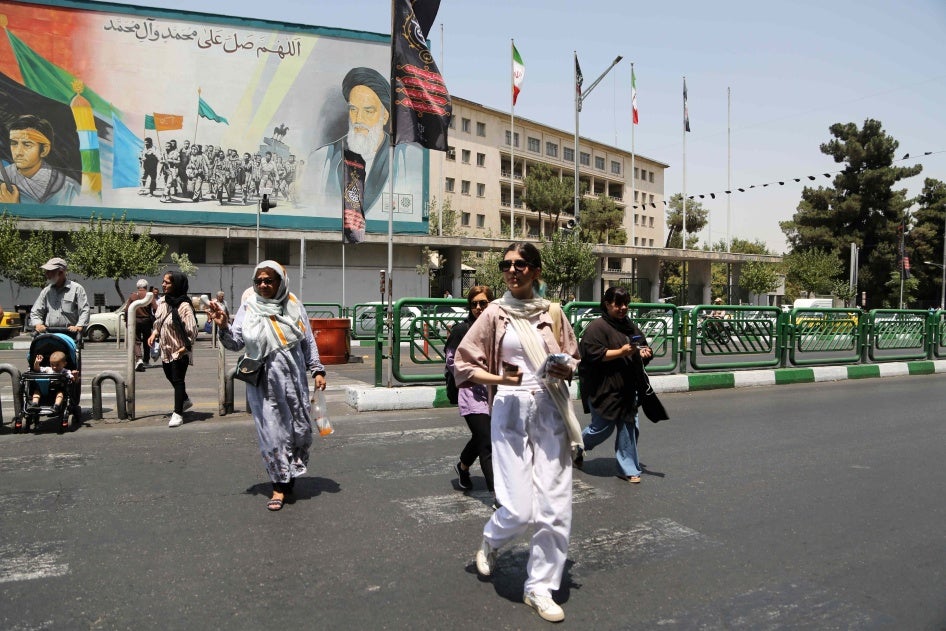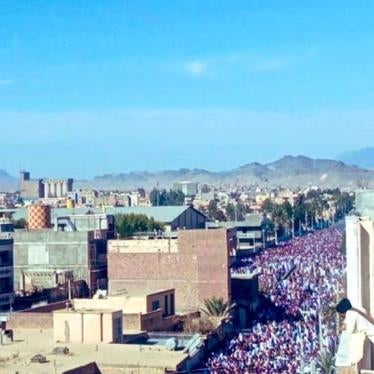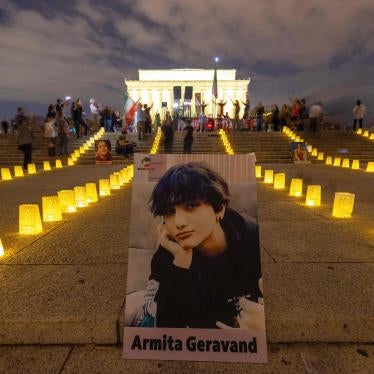(Beirut) – Iranian authorities show no signs of ending their brutal repression of peaceful dissent across the country one year after nationwide protests that erupted after the death in morality police custody of Mahsa Jina Amini in September 2022, Human Rights Watch said today in its World Report 2024. The authorities have also consolidated their efforts to increase punitive measures against women who defy compulsory hijab laws and businesses that do not enforce them on their premises.
Iranian authorities have killed hundreds of protesters, arrested thousands of people, and tortured scores of detainees, including women and children. Human rights groups are investigating the killing of more than 500 people, including 69 children, during the protests. The authorities have refused to open transparent investigations into security forces’ use of excessive and lethal force, torture, sexual assault, and other serious abuses, and have instead pressured families of victims to not hold public memorial services.
“For many, everyday life in Iran feels like a battle with a corrupt, autocratic government that has brought down the full force of its repressive machinery to quash dissent,” said Michael Page, Middle East deputy director. “Iranian authorities should know that anything short of fundamental change will only deepen public anger and frustration against their mismanagement and brutality.”
In the 740-page World Report 2024, its 34th edition, Human Rights Watch reviews human rights practices in more than 100 countries. In her introductory essay, Executive Director Tirana Hassan says that 2023 was a consequential year not only for human rights suppression and wartime atrocities but also for selective government outrage and transactional diplomacy that carried profound costs for the rights of those not in on the deal. But she says there were also signs of hope, showing the possibility of a different path, and calls on governments to consistently uphold their human rights obligations.
Scores of human rights defenders, journalists, members of ethnic and religious minorities, and dissidents are serving lengthy sentences after being convicted of national security charges in grossly unfair trials. Detained protesters have died in suspicious circumstances.
In the months leading up to the protest anniversary, Iranian authorities increased their crackdown on peaceful dissent through intimidation, arrests, prosecutions, and trials of activists, artists, dissidents, lawyers, academics, students, and family members of those who were killed during the 2022 protests.
Iranian authorities substantially increased the rates of executions in 2023. During the 2022 protests, judicial authorities drastically increased the use of vaguely defined national security charges that could carry the death penalty against protesters, including for allegedly injuring others and destroying public property. Following grossly unfair trials in which many defendants did not have access to the lawyer of their choice, Iranian authorities issued 25 death sentences in connection to the protests. As of September 20, the authorities executed seven people, though the Supreme Court overturned 11 other cases.
Iranian authorities intensified efforts to enforce compulsory hijab laws. They prosecuted women and girls, including actors, who refuse to wear the hijab in public, issued traffic citations for passengers without the hijab, and temporarily closed businesses that do not comply with hijab laws. In recent cases, the judiciary mandated psychological treatment for at least two actresses convicted of not complying with hijab laws, a move Iranian mental health associations protested.
On September 21, the Iranian parliament approved a draft Hijab and Chastity Bill with 70 articles proposing additional penalties, such as fines, increased prison terms up to 10 years for expressing opposition to hijab regulations, and restrictions on job and educational opportunities for hijab violations. The law also expands the authority of intelligence and law enforcement agencies in enforcing the compulsory hijab.
The authorities also intensified pressure on the Bahai religious minority community, arresting and resentencing several prominent members of the community.
Human Rights Watch documented far harsher use of repressive tactics, including arbitrary arrests and excessive use of force, in ethnic and religious minority areas of Kurdistan province and Sistan and Baluchistan province, which have played leading roles during the protests. Over the past year, the authorities have imposed several localized internet shutdowns, particularly in Sistan and Baluchistan province during mass protests.
“With rampant systemic impunity inside Iran, the UN Human Rights Council member states should ensure that independent investigations into serious allegations of abuse continue at the UN level,” Page said.









